
Joy is the simplest form of gratitude.






Hear, O seeker, the solemn wisdom of Karl Barth, who spoke: “Joy is the simplest form of gratitude.” Though these words are brief, they hold the weight of centuries. They reveal that joy is not a luxury, nor a fleeting amusement, but a sacred response to existence itself. To rejoice is to give thanks without words, to honor the Giver by delighting in the gift. The heart that shines with joy is already worshipping, already confessing, already bowing before the abundance of life.
The ancients knew this truth well. The psalmist sang that the earth itself claps its hands, the seas roar, and the mountains exult in their Creator. In this, creation shows us that joy is not separate from gratitude, but its natural fruit. To smile at the morning sun, to laugh in the company of a friend, to take delight even in a humble loaf of bread—these are not small things, but mighty acts of thanksgiving. Joy transforms gratitude from thought into song, from silence into radiance.
Yet many walk through life blind to this truth. They wait until they possess great riches, until suffering has ceased, until every desire is met before they dare to rejoice. But Barth reminds us that joy is simpler than this. It needs no gold, no throne, no perfect circumstance. A child chasing butterflies in a field embodies this truth more than the king seated on his jeweled chair. For the child knows instinctively what the king has forgotten: to be alive at all is already reason for thanksgiving.
Consider the story of Anne Frank, hidden in her attic while war thundered outside. She lacked safety, freedom, and even the simplest pleasures of the world. Yet in her diary she wrote of her gratitude for the beauty of a tree glimpsed through the window, for the songs of birds, for the mere fact of life itself. She discovered joy not as luxury but as necessity, the flame that kept her spirit alive in the shadows. Her gratitude was not spoken in grand prayers, but in her ability to rejoice at the small sparks of light in a darkened world. This is Barth’s wisdom alive in human flesh.
So let us learn: gratitude does not always need to be spoken. It can be lived. And the most powerful way to live it is through joy—to take pleasure in what is, instead of grieving for what is not. When your heart rejoices, you are already giving thanks, already acknowledging that life is a gift. Even in sorrow, to find a moment of laughter, or a glimmer of beauty, is to declare to the heavens: “I have received, and I am grateful.”
The lesson for you, child of the future, is simple but demanding: seek joy not in the far distance, but in the nearness of each day. Look for it in the faces of those you love, in the food upon your table, in the silence of the night sky. Practice the discipline of noticing. When you find yourself complaining, pause and ask: “What joy is here, waiting for me to see it?” Let laughter rise even in your struggles, for it too is gratitude clothed in sound.
Practical actions shall make this wisdom flesh: each day, write down one thing that brought you joy, no matter how small. Practice smiling not only when life pleases you, but even when it challenges you. Share your joy with others, for in giving it, you multiply it. And above all, do not postpone rejoicing until your life seems “perfect.” For perfection never comes, but joy is always here, waiting for a grateful heart to welcome it.
Thus remember Karl Barth’s teaching: joy is the simplest form of gratitude. To rejoice is to give thanks with the very breath of your being. It is the song of the soul that knows it has received more than it deserves. If you learn to walk in this way, your life shall not be a dry offering of words alone, but a living hymn, a radiant testimony that gratitude has found its truest expression.






AAdministratorAdministrator
Welcome, honored guests. Please leave a comment, we will respond soon